nutribollocks
Two scams in which the alleged ingredients don’t exist, and the alleged evidence can’t be traced.
Read more on the original IMPROBABLE SCIENCE page
Sales of chondroitin and glucosamine are a worth billions of dollars, but the evidence that they work has never been good.
A new meta-analysis of clinical trials now shows that chondroitin on the symptoms of osteoarthritis is “minimal or nonexistent”.
(Reichenbach S and others. Meta-analysis: Chondroitin for osteoarthritis of the knee or hip. Annals of Internal Medicine 146:580-590, 2007: download the paper]
It is the same old story. Early trials were small and badly-designed. They seemed to show some effect, which was wildly exaggerated by the supplement hucksters to push sales. Eventually somebody does the trials properly, and it is found that there is little or no benefit.
Look at Figure 6 from the paper (below). It shows the size of the beneficial effect plotted against the year of publication. The black circles represent trials with a large number (over 200) patients, the white circles are smaller (and mostly badly-designed) trials. As soon as the trials are done properly, the alleged benefits vanish.
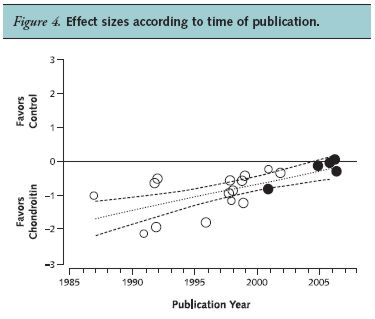
The authors conclude “Use of chondroitin in routine clinical practice should therefore be discouraged.”
Analyses by ConsumerLab.com has reported that 8 out of 20 products said to contain chondroitin failed its quality tests, with four containing between 0% and 8% of amount stated on the label.
Glucosamine shows a similar trend. Glucosamine is a synthetic chemical, but it is not a licensed medicine in the UK. It is marketed as a “food supplement”, not as a drug. It is not approved for precription on the NHS. The latest Cochrane review does not entirely rule out some benefit, but again the effects seem to get smaller as the trials get better.
Thanks to Quackwatch for the alert about the Reichenbach paper.
Twenty-five hospitals from London and southern and eastern England have already either stopped sending any patients to the Royal London Homeopathic Hospital or agreed to fund only a handful A campaign has started o save it, but the arguments are far from convincing.
This is reposted from the original IMPROBABLE SCIENCE page
The news is out. It was in February this year when I first saw some “Commissioning Intentions 2007-08” documents from several London NHS Primary Care Trusts (PCT), indicating their intention to break their contracts with the RLHH on the very reasonable grounds that homeopathy doesn’t work. It seemed better to wait for the intentions to be implemented before saying much, because of the inevitable outcry from those who want sugar pills at the taxpayers’ expense.
Then, in March 2007, the Health Services Journal carried a story “PCTs consider alternative to homeopathic hospitals” (free registration, or read it here).
|
On 8 April 2007, The Observer carried a special report, prominently featured on page 3.
|
 Fisher and Queen, Observer 8 April 2007 |
Peter Fisher, clinical director of the RLHH, is quoted as saying
“Twenty-five hospitals from London and southern and eastern England have already either stopped sending any patients to the RLHH or agreed to fund only a handful.”
“Prince Charles is sympathetic, supportive and concerned. But he doesn’t feel it’s appropriate to intervene in any way because there’s been some adverse publicity before about him ‘meddling’. ”
Fisher attributes this to the letter sent to PCTs by 13 of us, last May, in which we advocated that the NHS should not be paying for “unproven or disproved treatments”. The leading signatory on this letter, Professor Michael Baum, is quoted in the Observer thus.
“If the Royal London were to close because of PCT deficits we would scarcely miss it”.
“Homeopathy is no better than witchcraft. It’s no better than a placebo effect. It’s patronising and insulting for adults.”
“Instead you could have a centre for palliative and supportive care, which would be of greater benefit and involve half the cost. Rather than losing something, we would gain something.”
The backlash
The reaction seems to have started with a letter from homeopath Carol Boyce. Her letter starts thus.
| ROYAL LONDON HOMEOPATHIC HOSPITAL UNDER SIEGE “Death by stealth. The Royal London Homeopathic Hospital (RLHH) – the visible presence of homeopathy within Britain’s NHS – an institution putting homeopathy in the public mind for the last 150 years – the place where homeopathy was seen to perform so well in the cholera epidemic of the 1840s – is being dealt a DEATH BLOW” |
I’d guess the very first sentence must be something of an embarrassment to the RLHH’s clinical director, who is far too sensible to believe that cholera can be cured by homeopathic sugar pills.
The red herring about cholera is repeated ad nauseam on hundreds of homeopathy sites (though most are curiously silent about whether they really believe that sugar pills can cure cholera). It is based on the report that during the London Cholera epidemic of 1854, of the 61 cases of cholera treated at the London Homeopathic Hospital, 10 died (16.4%), whereas the neighbouring Middlesex Hospital reported 123 deaths out of 231 cases of cholera (53.2%). Apart from the lack of any knowledge of the state of the patients on entry to hospital, it was also the case at the time that conventional medicine was no more based on evidence than homeopathy. Indeed the initial popularity of homeopathy could well have resulted not only from wishful thinking, but also because doing nothing at all (i.e. homeopathy) was less harmful than blood letting. The fallacy of the argument was spotted very early on by Oliver Wendell Holmes (senior) in his famous essay, Homeopathy and its Kindred Delusions.
But medicine moved on and homeopathy didn’t. The history of cholera, like that of tuberculosis, contrary to what is suggested by homeopaths, is a triumph for evidence based medicine. The epidemic was halted not by homeopaths but by the careful observations of John Snow that led to his removing the handle of the Broad Street pump. If medicine had been left to homeopaths, people would still be dying of these diseases.
Carol Boyce invites you to write directly to Queen Elizabeth II, to save the RLHH. She has also started an e-petition on the UK government site. The petition includes the words
| ROYAL LONDON HOMEOPATHIC HOSPITAL UNDER SIEGE
“The RLHH has been part of the Health Service for 150 years. ” “In 2005, 67% of GPs and 85% of practices in it’s [sic] Primary Care Trust, referred patients to the hospital. The hospital provides effective and most importantly, COST-EFFECTIVE treatments.” |
Ms Boyce seems not to have noticed that the Prince of Wales’ own Smallwood report decided that there was not enough evidence to come to firm conclusions about cost-effectiveness.
Peter Fisher himself has appealed for the survival of the RLHH in a letter dated 9 March 2007 [download copy of letter].
“The Royal London Homoeopathic Hospital needs your support
09/03/2007By Dr. Peter Fisher, Homeopath to Her Majesty, the Queen.
There is no silly talk about cholera here, but there is a useful list of Trusts who have decided to abandon "unproven and disproved treatments". Fisher recommends you to read Marcia Angell’s book to learn about the deficiencies of the drug industry. I recommend that too. I also recommend Dan Hurley’s book on the even greater deficiencies of the quackery industry.
Fisher suggests you write to your MP to prevent closure of the RLHH.
I suggest you write to your MP to support closure of the RLHH.
The Times Higher Education Supplement (THES) published another bash at BSc degrees in anti-science. This one was accompanied by a defence from Brian Isbell, head of the department of complementary therapies at Westminster University. Isbell’s defence was different from Westminster’s first defence, but every bit as unsatisfactory, in my view.
Following the kerfuffle caused by Nature, THES asked for 800 words on the same topic, Bachelor of Science degrees in subjects that are anti-science (read it here). Every time I read an official validation document I am reminded inexorably of the inimitable Laurie Taylor, which is why the article starts thus.
| The vice-chancellor of Poppleton University is pleased to announce that the university’s finances have been transformed since the conversion of its old-fashioned department of physics and astronomy into the new department of alternative physics and astrology. Quality is ensured by the course validation and top Quality Assurance Agency rating, both awarded by a distinguished panel of academics with appropriate expertise in astrology. (Apologies to Laurie Taylor.) |
As it happens, Laurie Taylor’s column in the same issue of THES is on “Maintaining Standards”, and is as grimly hilarious as always. And his column in the following week (13th April) was about the report of the external examiner, Professor J.K.L. Anonymous, on the Universlity of Poppleton’s BSc in palmistry (“There were 36 first-class papers, 22 upper seconds and only one marginal failure”. Well, there’s a coincidence.
My piece ends thus.
| If a few vice-chancellors appear to value bums on seats more than honest science they should justify their views in public. |
THES plans soon to bring us some responses from the hitherto elusive vice chancellors. That should be interesting. Well they should have been interesting, but all but four of the sixteen letters that were sent by THES were ignored entirely, and the four replies that were received were deemed to be too boring to publish.
| This was accompanied by an article by Brian Isbell, who is head of the department of complementary therapies at Westminster University. He presumably had a hand in the (unsigned) response of Westminster to the Nature article, but this time the response was rather different (could that be because he’d read my comments on the original response?). This time there was no quoting of bad evidence, or the Society of Homeopaths, but rather a defence based on the fact that BSc degrees in CAM include some real scientific content. Let’s take a look at this new response. Isbell says |  Brian Isbell |
| “The shared philosophy across Westminster’s range of complementary therapy degrees is that students need a compulsory core of health sciences. This includes anatomy, physiology, biochemistry, pathology and differential diagnosis. Phytochemistry and pharmacology are included for degrees in herbal medicine and nutritional therapy.” Brian Isbell |
So on Mondays and Thursdays (for example) the students must believe that response increases with dose, but on Tuesdays and Fridays they are called upon to believe that response decreases with dose.
Isbell admits as much himself when he says “at times students have to work with conflicting scientific models that may not always fit with their clinical practice”. What he does not say is how this absurd conflict is resolved, or how it can be made compatible with science or simple common sense. The course evidently teaches you how to believe several mutually contradictory things at the same time, or at least on alternating days. You don’t need to be a scientist to see that is plain daft.
Not only are some of the doctrines of CAM incompatible with science or common sense, but they are often also incompatible with each other. Homeopaths subscribe to the bizarre doctrine that the less you give the bigger the effect, but herbalists do not. Herbal medicine is nothing other than pharmacology, albeit pharmacology as practised at the beginning of the 20th century, before biological standardisation was introduced to assure constant potency of medicines. So they want to give a sensible dose, but don’t know what it is. Nutritional therapists go to the opposite extreme and want to give huge (and sometimes toxic) doses.
I have been told that herbal medicine students at Westminster are instructed not to talk to the homeopaths in another part of Isbell’s school, because they talk rubbish. They even have separate sections on the university’s intranet, so that one sort of CAM can’t be polluted by the beliefs of a different sort of CAM. Likewise, students of reflexology are taught that a small area on the big toe is connected with the pituitary gland. Not only is this incompatible with physiology, but it is also incompatible with homeopathy, herbal medicine and nutritional therapy.
The department of complementary therapies seems to resemble a collection of religious sects at war with each other, rather than anything recognisable as science.
The second plank in Isbell’s new defence is that students are taught to develop research skills. Homeopathy students get one course (out of 22) called “Methods of Research in Complementary Medicine”, and a project, “Research in Practice”. It is impossible to know what is taught on these courses because the university refuses to release any of the course materials. But I find it hard to imagine that the courses are very critical when the official response from the university cited the Spence (2005) study as though it provided evidence for the efficacy of homeopathy.
If that is the best the teachers can do, what hope is there for the students?
The media reports on the alleged advantages of drinking purple grape juice were uniformly misleading. The study by Alan Crozier did not measure health benefits but was a chemical analysis. Its interpretation in terms of health were arguably over-optimistic.
Read more on the original IMPROBABLE SCIENCE page
A TV company funded a rather uninformative study of omega-3 fish oil by Prof Basant Puri if Imperial College and the Hammersmith Hospital. The media reports on the study were totally misleading It was not revealed that Prof Puri is named as “inventor” on a paten for the fish oil formulation, as discovered by Ben Goldacre.
Read more on the original IMPROBABLE SCIENCE page
Channel 4 TV, Monday 12th March. This is the title of the Channel 4 TV documentary, Dispatches.
Lord Wedderburn, QC, a life peer and Emeritus Professor of Law at the London School of Economics, tells the programme:
“If, in fact, nothing changed and he became King, then there would be a most almighty fuss and controversy, and eventually the whole fabric of the constitutional monarchy could be threatened.”
The Prince’s Foundation for Integrated Health (FIH) is the Prince’s lobby group which attempts to make the hard-pressed NHS spend more money on unproven and disproved treatments. The FIH publishes “Complementary Healthcare: a Guide for Patients”. This document is not just barmy, but positively dangerous. In the rebuttal of the programme on the FIH web site, they claim that they do not promote alternative medicine, but elsewhere on the site they state their aim as “makes safe and effective complementary therapies available to patients in conjunction with conventional healthcare”.
Which would be all very well if they didn’t consistently ignore the evidence for effectiveness.
The MHRA recently, for the first time, betrayed its brief to nake sure that medicines work and are safe. This action has been condemned by just about every professional organisation. Nobody knows exactly what caused them to lose their heads in this way, but it is clear that they were under pressure from both the Department of Health and from the Prince of Wales. The Department of Health is clearly sympathetic to quackery, as shown by the letter below, and by their refusal to allow alternative medicine to be referred to NICE for assessment.
| The MHRA admit to having had at least seven letters form the Prince of Wales, and we know that an MHRA member has met the Prince at Clarence House at least once. But all the contents are secret from the public. The Chairman of the MHRA Agency Board, Prof Alasdair Breckenridge, and chairman of their Herbal Medicines committee, Prof Philip Routledge, have both admitted to me to having had pressure from the Prince of Wales, but neither will give any details, despite having been condemned by their own professional organisation, the British Pharmacological Society. | 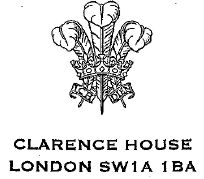 |
The Pharmacological Society’s statement read thus.
| The British Pharmacological Society believes that any claim made for a medicine must be based on evidence, and that it is the duty of the regulatory authorities, in particular the MHRA, to ensure that no claims can be made for the efficacy of any form of medicine unless there is good evidence that the claim is true. Despite many years of investigation, we have no convincing scientific evidence that homeopathic remedies work any better than placebo. Pharmacologists have noted frequently that most homeopathic products are diluted to the extent that they contain no molecule of active ingredient, that is, no medicine, which is highly misleading to consumers who are unlikely to recognise the expression “30C” for example. Furthermore, there are serious concerns, even in cases where they are used for minor ailments, that officially endorsed use of such remedies may put patients at risk of delayed diagnosis. The Society is therefore surprised that the national rules scheme for licensing homeopathic products, which came into force on 1 September (Statutory Instrument 2006 1952), will regard non-scientific data as evidence of efficacy. |
An excellent article on this topic was published by Rose in The Biologist, British health care regulation moves away from science.
The appalling treatment of Professor Edzard Ernst
| Edzard Ernst was the UK’s first professor of complementary medicine, and he is rather unusual in that field because he is totally honest, and very careful about evidence (something that has not always endeared him to the alternative medicine industry).
A letter was sent from Clarence House to the vice-chancellor of Exeter University, Steve Smith. The letter alleged a breach of confidence by Ernst. Having been sent a draft of the Smallwood report, Ernst was so horrified by the scientific standards in that document, he felt obliged, in the public interest, to speak out about it. Ernst was contacted by a newspaper, which had a copy of the draft, and described the initial findings as “outrageous and deeply flawed”. He added: “It is based on such poor science, it’s just hair-raising. The Prince … also seems to have overstepped his constitutional role” |
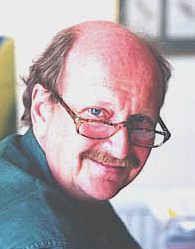
Prof Edzard Ernst. |
Prof Ernst was doing exactly what academics are meant to do. As a result he was subjected to a very prolonged disciplinary procedure, and for a year it was not obvious whether he’d keep his job. For a Prince, in a constitutional monarchy, to put pressure on a university to silence a conspicuously honest academic is just not acceptable.
The Prince of Wales behaviour was bad enough, but, to be generous, he is perhaps, a well-meaning but poorly educated man, filling in his time as best he can.
| In the story of Edzard Ernst, the behaviour of the Vice-Chancellor of Exeter University, Prof Steve Smith seems to me to be unforgivable. Instead of supporting his staff, and supporting academic freedom, he appeared to cower before the Clarence House letterhead. After keeping Prof Ernst on tenterhooks for an entire year he eventually deigned not to fire him in the most grudging and unpleasant way imaginable. |
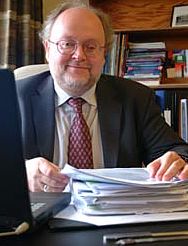 Prof. Steve Smith, Vice chancellor. |
That is illustrated by the end of Smith’s letter to Professor Ernst on 13th October 2006. It was shown on the TV programme, and is reproduced below.

Click to enlarge
The Daily Mail also has features on the healthiness of HRH’s own food lines, after his criticism of MacDonalds, Dutchy Original Sins, and here.
They are worth reading because the advice comes from Catherine Collins, a real dietician, not a nutribollocks guru.
Some responses The story was reported round the world.
Max Hastings (Guardian)
“To make good use of evidence, it is essential to possess not only intelligence, but a capacity for disciplined analysis. The prince has considerable virtues, a good heart notable among them. But he has always lacked discipline in his life and in his treatment of issues. Again and again, he gets himself into trouble by seeking to address matters that are, frankly, beyond his intellectual reach.”
This post has been transferred from the old IMPROBABLE SCIENCE page.
Two interesting papers. One shows popular anti-oxidant ‘supplements’, beta carotene, and vitamins A and D, far from making you live longer, have the opposite effect. Another shows that garlic does not lower cholesterol. And some publicity for Dan Hurley’s book, Natural Causes. An update looks at the activities of the supplements industry spokesperson. Dr Ann Walker, who seems sometimes to forget to declare her interests.
First let’s reiterate the myth of antioxidants
Nutribollocks: the antioxidant myth
“Nutritional supplements” are one of the most profitable scams (see, for example, Healthwatch, Quackwatch, and Holfordwatch).
There is a nice article by Lisa Melton on The Antioxidant Myth: a medical fairy tale in tne New Scientist (and see here), [download as pdf] . Here are some quotations.
| Cranberry capsules. Green tea extract. Effervescent vitamin C. Pomegranate concentrate. Beta carotene pills. Selenium. Grape seed extract. High-dose vitamin E. Pine bark extract. Bee spit.You name it, if it’s an antioxidant, we’ll swallow it. According to some estimates around half of US adults take antioxidant pills daily in the belief that they promote good health and stave off disease. . . . In 1992 researchers at the US National Cancer Institute set about testing beta carotene. The trial was set to run for 6 years, but two-thirds of the way through the researchers pulled the plug after discovering, to their surprise and horror, that those taking supplements were doing worse than the controls. They had developed 28 per cent more cases of lung cancer, and their overall death rate was 17 per cent higher. It’s a similar story with the world’s most popular antioxidant. Vitamin E shot to fame in the early 1990s, after two large studies involving more than 127,000 people in total found that those with a diet high in vitamin E were significantly less likely to suffer cardiovascular disease. Use of vitamin E supplements soared. In 1990, almost nobody took vitamin E; by the end of the decade an estimated 23 million US citizens were knocking back daily doses. |
“Treatment with beta carotene, vitamin A, and vitamin E may increase mortality”
That is the conclusion of a recent paper in the Journal of the American Medical Association, “Mortality in Randomized Trials of Antioxidant Supplements for Primary and Secondary Prevention” Systematic Review and Meta-analysis”, [Get the full text].
This isn’t original research, but a meta analysis that attempts to collate existing data taking into account the reliability of each source. The aim was to analyze the effects of antioxidant supplements (beta carotene, vitamins A and E, vitamin C [ascorbic acid], and selenium) on deaths (from any cause) in adults. The analysis seems to have been done well, and the results are startling. They aren’t just a waste of money, but some of them are actually bad for you. In 47 low-bias trials with 180 938 participants, beta carotene increased death rates by 7 per cent, vitamin A by 16 per cent, and vitamin E by 4 per cent (when taken separately). Vitamin C gave contradictory results and selenium showed no detectable effect.
This work got an excellent write-up in The Times, by their health correspondent, Nigel Hawkes. This was followed by a predictably silly defence of nutribollocks by the Times’ Dr Thomas Stuttaford (known in Private Eye as Dr Utterfraud). Luckily, this was neutralised by a second piece on the same page by Nigel Hawkes, “Phooey. Sensible balanced diet is the best investment”:
“ In nutrition, a plausible idea and a little bit of evidence are all that is needed to create a market. And such is the megaphone of marketing and the influence of countless “healthy eating” articles that these ideas, even the half-baked ones, can lodge very firmly in the national psyche.”
It’s a nice coincidence that this study came out while I was reading Dan Hurley’s book, Natural Causes (see below). This book sets out dramatically the harm, sometimes serious harm, that untested “supplements” have done to some individuals. But for me the most interesting part is the revelation of the political lobbying by this $20 billion supplement industry, with the aim (largely successful) of undermining the FDA and escaping from any effective regulation of its absurd, but exceedingly profitable, claims. The supplements industry puts the Prince of Wales in the shade when it comes to subverting common sense and good science.
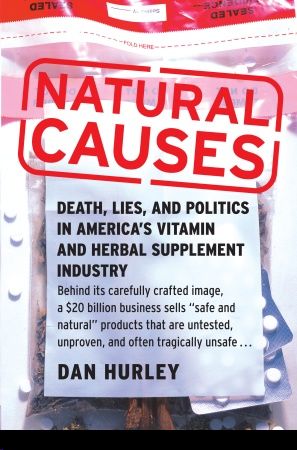
The Health Supplements Information Service (HSIS)
Needless to say, the supplements industry has already organised vilification of this excellent bit of work.
According to their web site,
“HSIS is funded by The Boots Company PLC, Bayer PLC, Perrigo, Seven Seas Ltd and Wyeth Consumer Healthcare. The campaign is co-ordinated by PAGB (Proprietary Association of Great Britain)”.
So it’s no surprise that their spokesperson. Dr Ann Walker, immediately tried to discredit the study, saying “The results of these mixed-sample metaanalyses are worthless” (The Times).
This same Ann Walker recently wrote and editorial in the British Journal of General Practice (January 2007). The editorial concludes “Although still considered to be controversial by some, taking a daily multinutrient supplement would bridge the gap between intake and requirements and ensure that nutrient target intakes are met.” But in this editorial her affiliation is given as Senior Lecturer in Human Nutrition, University of Reading. No mention at all of her role as spokesperson for the Supplements industry. Tut tut.
Patrick Holford too
Needless to say, supplement salesman Patrick Holford has weighed into the vilification. His objections have been dealt with nicely on the cutely named web site stopholfordtalkingrubbish.blogspot.com. Find the answers here.
Holford is the man who, in the BMJ said “Competing interests: none declared”, when promoting his supplements.
No interests? Holford himself has said
“any product, be it a publication, seminar, food or supplement, that is authored/invented by me has my name on it and earns me a royalty/payment. That is how I live and fund my research.”
So what about the galaxy of supplements being sold at “Health products for Life”? They say “we only supply supplements, foods and drinks that are recommended by nutrition expert, Patrick Holford.” And at the bottom of the page it says “©Copyright 2007 Holford and Associates. All Rights Reserved”. Companies House lists the sole shareholder in ‘Health Products for Life’ as P.J. Holford.
Garlic is no good either
Another interesting recent paper has appeared in Archives of Internal Medicine
Garlic is widely promoted as a cholesterol-lowering agent, but the evidence so far has been lousy. In this trial, 192 adults with low-density lipoprotein cholesterol (LDL-C) concentrations of 130 to 190 mg/dL (3.36-4.91 mmol/L) were randomly assigned to one of the following four treatment arms: raw garlic, powdered garlic supplement, aged garlic extract supplement, or placebo.
“Conclusions None of the forms of garlic used in this study, including raw garlic, when given at an approximate dose of a 4-g clove per day, 6 d/wk for 6 months, had statistically or clinically significant effects on LDL-C or other plasma lipid concentrations in adults with moderate hypercholesterolemia.”
Another purveyor of nutribollocks who has been dissected and exposed by Ben Goldacre. His views on AIDS are a menace to humanity. And, incredibly his course has been accredited by the University of Bedfordshire (formerly known as the University of Luton).
Read full entry on the original IMPROBABLE SCIENCE page.
The BBC2 Newsnight programme, in an excellent bit of investigative journalism, has shown that an ex-arms dealer, Michael Hart Jones has conned the Swaziland government with his claims to cure AIDS with a useless and probably dangerous treatment for AIDS based on goat serum.
Read full entry on the original IMPROBABLE SCIENCE page.
The regulations that allow unjustified claims to be made for homeopathic pills were the subject of an annulment debate in the House of Lords on 26 October 2006. The regulations were introduced as a statutory instrument.
“Statutory Instruments (SIs) are a form of legislation which allow the provisions of an Act of Parliament to be subsequently brought into force or altered without Parliament having to pass a new Act.”
In other words a minister just decides to do it without any debate or parliamentary approval
“The instrument is laid after making, subject to annulment if a motion to annul (known as a ‘prayer’) is passed within 40 days.”
The BBC Today programme covered the event before the debate. Lord (Dick) Taverne put the view of reason and common sense superbly, against some totally evasive fantasies from Imogen Spencer of the Society of Homeopaths. He is the author of “The March of Unreason: Science, Democracy, and the New Fundamentalism“). [Listen to the interview: mp3 file, 5.6 Mb]
Read the debate
The debate can be read in Hansard. In the archaic language of the House.
“Lord Taverne rose to move, That an humble Address be presented to Her Majesty praying that the regulations, laid before the House on 21 July, be annulled (S.I. 2006/1952). [44th Report from the Merits Committee].”. Here are a few quotations.
Lord Taverne
“There is one very important, absolutely fundamental objection to this regulation. For the first time in the history of the regulation of medical products, it allows claims of efficacy to be made without scientific evidence. It is an abandonment of science and the evidence-based approach. Under this new regulation, the sole basis on which claims of efficacy can be made for homeopathic products quite legally is "homeopathic provings". There is no need for clinical or scientific tests. Homeopathy is not based on science and is not a science in any sense whatever.”
.Let me read just three of the comments, the first from the British Pharmacological Society. I quote it first because two members of the MHRA, including the chairman, have pharmacological qualifications. The society says:
“The British Pharmacological Society believes that any claim for a medicine must be based on evidence, and that it is the duty of the regulatory authorities, in particular the MHRA, to ensure that no claims can be made for the efficacy of any form of medicine unless there is good evidence that the claim is true. Despite many years of investigation, we have no convincing scientific evidence that homeopathic remedies work any better than placebo”.
.
“What it has done is to promote what is in effect the selling of snake oil. This statutory instrument should be withdrawn;it is a disgrace. I beg to move.”
Lord Rees of Ludlow (Martin Rees, President of the Royal Society)
“ My Lords, the Royal Society, of which I have the honour to be president, believes that all complementary and alternative medicines should be subject to careful evaluation of their efficacy and their safety. All treatments so labelled should be properly tested and patients should not receive misleading information.
There are no great concerns about the safety of homeopathic treatments. What is at issue is their effectiveness. Obviously placebo effects can be powerful, nobody denies that. It is, however, quite different to assert that homeopathic treatments offer benefits beyond a placebo. Indeed, if medicines can really work even when so diluted that barely a single molecule is left, this would entail some fundamentally new scientific principle with amazingly broad ramifications. It would mean that materials like water carry imprints of their past and can remember their history, as it were, in some quite novel and mysterious way. If that were the case, it would have fundamental implications for precise experiments over the whole of science.
So it seems to me that the burden of proof on homeopathic remedies should actually be higher, not lower, than for conventional ones. Extraordinary claims demand extraordinary evidence. To put it mildly, so-called “homeopathic provings”; seem to fall far short of that. That is why I wholeheartedly support what the noble Lord, Lord Taverne, is saying on this issue.
Excellent speeches were made on the side of reason by Lord Turnberg (ex-professor of medicine and ex-president of the Royal College of Physicians) and Lord Jenkin of Roding . (who, as Patrick Jenkin, was a member of Margaret Thatcher’s government).
The 30th Countess of Mar
All of this counted for little with the Countess of Mar, a heriditary peer and organic farmer who opposed the annulment. She was, I fear, rather selective with the evidence. She quotes, for example,
“Professor Madeleine Ennis of Queen’s University, Belfast, with a large pan-European research team led by Professor Roberfroid of the Catholic University, Louvain, set out to show that homeopathy and water memory were utter nonsense. This was an exercise conducted with extreme scientific rigour.” . . . “In the end, she had to concede that high dilutions of the active ingredients in homeopathic solutions worked, whether or not the active ingredient was present in the water”
Bits of Lady Mar’s speech bear an extraordinary resemblence to an article written in the Guardian in 2001, by Lionel Milgrom (maverick chemist and apologist for homeopathy). I wonder who wrote it for her?
The Noble Countess appears not to have noticed that the first author on both of Ennis’s papers was Philippe Belon. who is a director of the huge French homeopathic company, Boiron. In fact the address on the papers is not the University of Belfast (or Louvain), but it is “Boiron, 20 rue de la Liberation, 69110 Sainte-Foy-Les-Lyon, France.”
Boiron makes profits from homeopathy of about 20 miilion euros a year, on net operating revenues of about 300 million euros. It is big business. Philippe Belon has an interesting record.
He was one of the authors of the notorious Benveniste paper which lead to Beneveniste’s dismissal form INSERM in disgrace. The Countess also seems to have missed the careful refutation of Benveniste’s results by Hirst, Hayes, Burridge, Pearce and Foreman (1993, Nature.366, 525-7.
Belon was also senior author in Fisher, P., Greenwood, A., Huskisson, E. C., Turner, P., & Belon, P. (1989). (Effect of homoeopathic treatment on fibrositis (primary fibromyalgia) British Medical Journal 299, 365-366.). That is the paper which I was asked to check (by a TV programme). After Peter Fisher gave me the raw data I found that a naive mistake had been made in the statistical analyis. There was NO evidence for the effect of the treament at all, as described below. This correction was published (Colquhoun, D. (1990). Reanalysis of a clinical trial of a homoeopathic treatment of fibrositis. Lancet 336, 441-442.), though the correction is usually ignored by homeopaths (see below). [Get pdf].
How odd that all Belon’s papers seem to favour homeopathy.
Lord Colwyn
(The Rt Hon Lord Colwyn, CBE, a Conservative peer) also supported mumbo jumbo. Don’t you love this bit?
“I went on a course about 15 years ago on the relationship between quantum physics and homeopathy. I probably did not understand a word I was told at the time, but at least there was evidence that the two were linked.”
But he shouldn’t worry if he didn’t understand a word: it was just gobbledygook.
Lord Colwyn finished his speech thus.
“It is interesting to consider why homeopathy, which of all complementary therapies is probably at most variance with orthodox medicine, should have received sufficient support from the Government to be able to maintain a number of specialised hospitals.”
Well, agreed again, it is interesting -in fact it’s quite incredible.
What a pity, though, that Lord Colwyn quite forgot to declare his interests. He is vice-president of the Blackie Foundation Trust. This trust was “founded by Dr Margery Blackie in 1971, at that time homoeopathic physician to Her Majesty, the Queen. Dr Blackie saw the need to promote homoeopathic remedies to the wider community and to educate the public about the success of homoeopathy in treating illness.”.
He also forgot to mention that he is a patron of the National Federation of Spiritual Healers.
Lord Warner
(Lord Warner of Brockley, Minister of State at the Department of Health) defended quackery on behalf of the government. He says the legislation
“will, for the first time since the PLR scheme in 1971, allow homeopathic products to be marketed with information to the consumer about what they can be used for. This will provide better information to the consumer and reduce the risk of confusion. “
Lord Warner makes no comments about how claims made for efficacy in the absence of evidence can be called “better information” for the consumer
“We have done much as a Government to support science and research, and will continue to do so. Homeopathic products are, however, in a different category. Provided that such products are safe, properly manufactured and clearly labelled without making false claims, which they will be under the new national rules scheme, patients should not be denied access to them for the conditions to which they relate. “
What, one wonders, does “a different category” mean? The magic category? And since the manufacturers have just been excused from producing any evidence of efficacy, who is to judge what are “false claims”.
Some reports
The BBC report before the debate
The Daily Mail -pretty good stuff.
Interview with DC, vainly trying to counter the bunkum from the two previous speakers.
Read full entry on the original IMPROBABLE SCIENCE page.
The Consumers’ Association has had a good record in distinguishing true claims from false in washing machines and dishwashers. But in CAM, they seem to be out of their depth. They have been giving some very bad advice, of the sort you might expect from the lifestyle pages of the Daily Mail.
Read full entry on the original IMPROBABLE SCIENCE page.
The Royal Society , the UK’s national academy of science, has put a statement about alternative medicine on its “science issues” web site.
|
The Royal Society believes that complementary and alternative medicines, like conventional medicines, should be subject to careful evaluation of their effectiveness and safety. It is important that treatments labelled as complementary and alternative medicines are properly tested and that patients do not receive misleading information about the effectiveness of complementary medicine. Furthermore, NHS provision for complementary and alternative medicines, as for conventional medicines, should be confined to treatments that are supported by adequate diagnosis together with evidence of both effectiveness and safety.
|
Notice the very proper insistence that patents are not deceived about whether the “medicine” works or not. This is in stark contrast to the attitude of the MHRA, which has just endorsed misleading labelling.
The Independent has a good medical column br Dr Fred Kavalier. The column has an insert for readers’ letters. On 1st August 2006 the ‘readers write’ section had this letter “I know homeopathy has taken a bit of a bashing recently but homeopathic remedies for travel sickness have a long and excellent reputation for working. The most important ones are cocculus, petroleum and tabacum.”.
Dr Kavalier was appropriately apologetic about this, and published my response on 15th August.
Readers write DC, a scientist from London, replies to last week’s homeopath: |
The question of where delusion ends and fraud begins is an interesting one. A book by Robert Park of the American Physical Society discusses the question particularly well.
Voodoo Science: the road from foolishness to fraud (Oxford
University Press) is an excellent read. [Amazon].
| Robert Park deals with everything from perpetual motion macines to homeopathy. His thesis is that those who propagate these ideas often start with a genuine belief that what they say is true. Rejection of the ideas by sensible people just makes them more determined. Eventually, though, it probably dawns on many of them that they have made a terrible mistake. At this point, some recant, but more often they have so much reputation to defend, and frequently too much income to protect, that they will continue to propagate their ideas even after they have realised that they are wrong. | 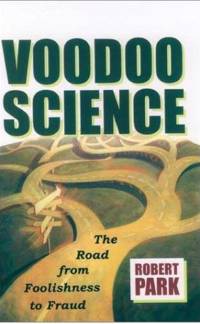 |
That is when foolishness becomes fraud. I have often wondered how many middle-aged homeopaths still really believe their own nonsense?
“Alas, to wear the mantle of Galileo it is not enough that you be persecuted by an unkind establishment; you must also be right.” (Robert Park)
